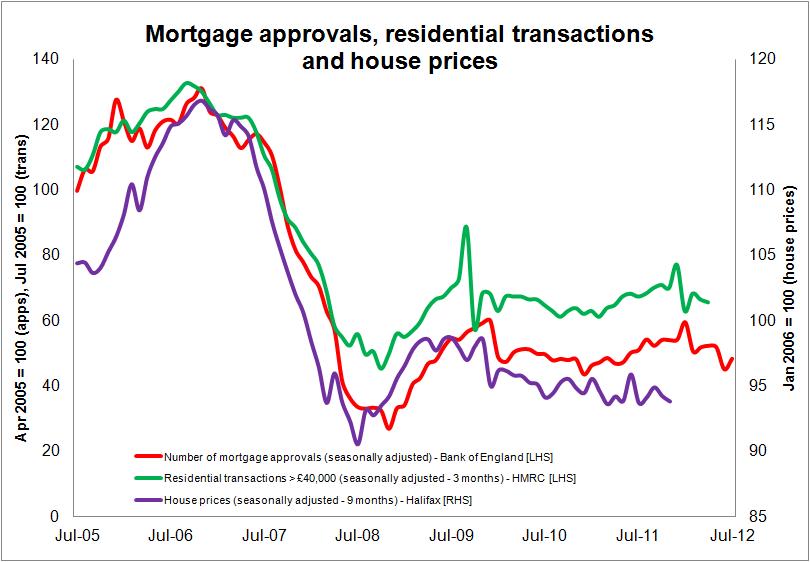The housing market is in a coma and the drugs don’t work – a bit more verve perhaps?
The housing market remains in a weird state of suspended animation. There is the odd flinch or twitch to give commentators (myself included) something to remark on and the Daily Express something to splash on its front page. But in reality things have been flat for about two years.
Naturally, with prices more or less flatlining, the reality is that houses in real terms are getting cheaper – that is to say the ones that are being sold are on average cheaper in real terms on a like-for-like basis as far as can be measured.
 The August housing survey from the surveyors’ body RICS describes the market as stable. But in an attempt to pep up the story the press release talks of shrugging off the “Olympic effect”.
The August housing survey from the surveyors’ body RICS describes the market as stable. But in an attempt to pep up the story the press release talks of shrugging off the “Olympic effect”.
Richard Donnell head of research at Hometrack makes some very valid points on the latest data saying: “Overall, the market remains in a fragile state. Thin volumes and a sluggish market, compounded by seasonal and one-off events, is reflected in the volatility of this month’s indicators. As the supply demand balance weakens, we expect to see slow downward pressure on prices over the remainder of 2012.”
But in many ways these points simply reflect the continuing fragility and could have been made in many months over the past year or so and probably were on a number of occasions.
Robert Gardner, Nationwide‘s chief economist, felt the need to do a bit more explaining after a rather surprising jump in the August monthly figure. He pointed to the one-off events and the awkwardness of accounting for these. He then went on to say: “Nevertheless, the fact that the annual pace of house price decline moderated to -0.7% in August from -2.6% the previous month provides evidence that conditions remain fairly stable.”
And Martin Ellis, housing economist at Halifax came right out and said: “House prices continue to tread water.”
This all pretty much sums up the state of the market over the past couple of years – stable, but fragile.
Naturally too, there is wide variation in prices, with London and parts of the south of England having enjoyed growth at the expense, statistically speaking, of the rest of the country.
Were these normal times having a fairly stable housing market would be great. But these are not normal times and we must not forget the market is not just about prices.
The stability we see in transactions is stability at a remarkably low level. Transactions remain broadly speaking at about half of what they were before the credit crunch.
 And as I and others have said many times before, if people are not buying and selling homes fewer private new homes are bought. That means fewer are built.
And as I and others have said many times before, if people are not buying and selling homes fewer private new homes are bought. That means fewer are built.
Lurking at the back of the minds of many analysts is concern that the housing market is not improving despite huge effort by Government (this and the previous) and its agencies.
Though it may be worth pointing out that these do not necessary represent the suite of efforts that I or others might advocate.
On the monetary side it is hard to see how much more lax the Bank of England could be than bringing interest rates down almost to the floor and electronically creating about a third of a trillion pounds of extra money through quantitative easing. This has helped to reduce mortgage rates and has boosted assets prices (houses very much among those assets) and inevitably reduced the numbers of homeowners who would otherwise have lost their homes.
On the fiscal side, the Government and its predecessor have, some argue, thrown billions of pounds at the housing market problem in direct cash, guarantees and reduced burdens.
If the housing market were a patient in the intensive care ward of a hospital there might be some doctors wondering whether to turn off the life-support system after such a long stretch of what now looks increasingly like an induced coma.
But that is not a political option, it would seem, and the Government has once again raided the drugs cabinet for yet more stimulants.
Rashly, as is its style, it has made yet more big claims (although slightly more modest than when it announced the Housing Strategy last November) for its latest round of big interventions to shock the housing market into action in a way that will mean more house building.
These interventions will undoubtedly have some effects. But it seems unlikely to me, and many others it would seem, that the effects will be on the grand scale that the Prime Minister suggests.
If the Government is to get Britain building homes, there is a strong case for rather more potent and perhaps more directly applied medicine.
One thought on “The housing market is in a coma and the drugs don’t work – a bit more verve perhaps?”
The housing market is a strange think. Builders and home sellers want high prices, however home buyers want low prices.
The key here is to try and find some balance between the two
Comments are closed.